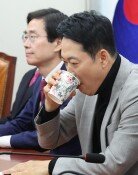[Editorial] Internal Strife of the Main Opposition Party
[Editorial] Internal Strife of the Main Opposition Party
Posted December. 08, 2008 05:16,
In the process of barely passing the 2009 budget bill this Friday, the main opposition Democratic Party has greatly disappointed with its insufficient sense of urgency and anachronistic way of opposing the ruling party. Some within the Democratic Party share the disappointment by blaming such an attitude for the partys low approval rating. The Democratic Solidarity, a group of self-claimed reformists within the opposition party, held a news conference yesterday and said, The Democratic Party must pull itself away from the agreement with the ruling party and fight until it secures 30 trillion won (20.3 million U.S. dollars) in funds to stabilize the peoples livelihood. It also announced talks with Democratic Party leader Chung Sye-kyun today to make its point. The partys plan is simply disturbing in that its main purpose is to break down the hard-won agreement between the two parties on the budget bill, which is already past its deadline. Exactly when this absurdity will end is anyones guess.
Launched Dec. 2, the Democratic Solidarity has key members of the now-defunct Uri Party such as Kim Geun-tae and Chun Jung-bae as cofounders, secretary general, policy commissioner, organizing committee chairman, spokesman and regional heads, making it a de facto a party within a party. It resembles lineage politics demonstrated by opposition parties in the past, whose abolishment was a major item on the Democratic Partys agenda. Even last years presidential candidate Chung Dong-young and his followers, responsible for the worst presidential election defeat for a legitimate opposition party in 50 years, have joined forces with the group, proving they still do not get what the public wants.
As soon as the solidarity group formed, its members quickly announced a battle of democracy versus dictatorship and President Lee Myung-bak. Their idea of struggle is reminiscent of a clear-cut opposition party advocated by those who fought against Koreas military dictatorships in the 1970s and 80s. The agony of the people from the economic crisis seems to be the last thing on the opposition partys mind. Judging from the past behavior of the members of the Democratic Solidarity, their intention behind the fund for stabilizing the peoples livelihood is questionable. Their suggestion for the fund only after the ruling and opposition parties painfully reached a budget agreement shows their true intent is to spoil the agreement and find an excuse to wage a power struggle. Their move can also be interpreted as an attempt to incapacitate the incumbent leadership so that they can justify their fight against dictatorship.
Politics aside, their plan to create the fund is simply reckless. Trillions of won will be needed just to overcome the crisis next year, let alone save the economy. Handing out money from a certain fund could resemble the failed attempt at blind welfare promoted by the previous Roh Moo-hyun administration.
Democratic Party leader Chung is reportedly in hot water over the allegation that the party leadership has surrendered to the ruling party. He should realize, however, that the crisis is about his entire party, not just the leadership.







